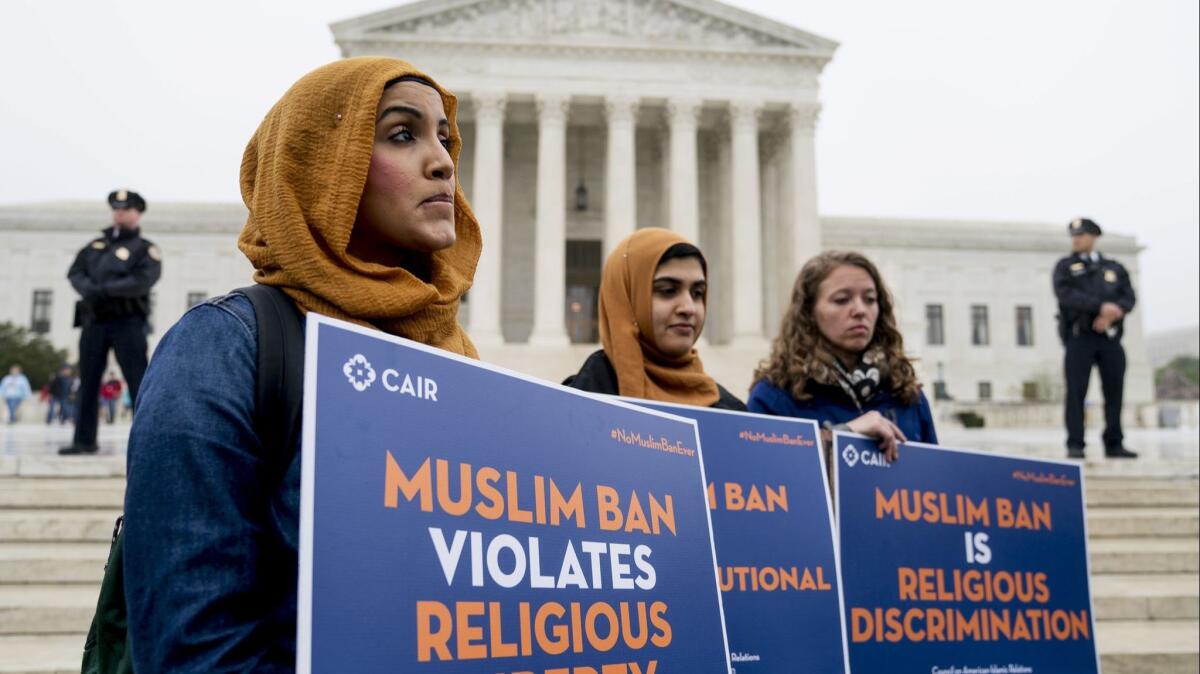Editorial: Whatever the Supreme Court decides on the law, Trump’s Muslim ban is bad policy

- Share via
It’s not looking terribly likely that the U.S. Supreme Court will strike down President Trump’s controversial travel ban. At Wednesday’s oral argument, members of the court’s conservative majority seemed skeptical about the assertion that the president doesn’t have the legal authority to bar travel to the U.S. from several Muslim-majority countries, or that the restriction amounted to an illegal “Muslim ban.”
But even if the court agrees — wrongly, in our view — that the ban can go forward legally, the fact remains that imposing such a broad exclusion based on discriminatory misconceptions is foolish and counterproductive policy.
From the early days of his candidacy, Donald Trump exhibited clear animus toward immigrants — particularly those from Mexico — and toward Muslims. After the December 2015 massacre in San Bernardino, in which a U.S.-born Muslim man and his Pakistani wife killed 14 people and wounded 22 others at an office holiday party before being killed themselves in a shootout with police, candidate Trump said he wanted “a total and complete shutdown of Muslims entering the United States until our country’s representatives can figure out what is going on.” He also called for a database of Muslims (before abandoning the idea later) and contemplated closing mosques, among other ideas repugnant to a free society. Whether Trump’s statements on the campaign trail can be used to challenge a policy he advanced after he was elected is a sticky issue for the court to grapple with, but Trump has made it abundantly clear that he has had trouble separating violent extremism from a mainstream religion.
Not a single person from any of the countries on the list has committed a fatal act of terrorism in the U.S.
Wednesday’s hearing, the last case before the court this term, focused on Trump’s third iteration of the ban. It bars people from seven countries from entering the U.S. without special clearance. Five of those countries — Iran, Libya, Syria, Yemen and Somalia — are Muslim majority. Trump extended the ban to North Korea and, to a more limited degree, Venezuela, two non-Muslim countries at diplomatic odds with the U.S.
The first problem with the ban is that it is bizarrely misfocused. Not a single person from any of the countries on the list has committed a fatal act of terrorism in the U.S. The 9/11 attackers, for instance, were primarily from Saudi Arabia. Terrorist attacks in Europe have been predominately committed by Europeans who fell into Islamic extremism. Would Trump add Belgium, where many of the terrorists behind the November 2015 Paris attacks were from, to the list of nations whose residents are barred? The linkage between terrorist acts and the banned nations is nonsensical.
The U.S. has for many years employed significant vetting practices in processing visa applications, procedures that were tightened after lapses allowed the 9/11 terrorists to enter. The administration has yet to spell out how and why it believes there is insufficient vetting of visa-holders from the now-banned countries (adding support to the idea that Trump was interested more in keeping out Muslims from countries not allied with the United States than in barring terrorists). The effect of the clampdown has been a further deterioration in relations between the U.S. and the Muslim world, an undercutting of the principles of openness upon which American society is founded and an embrace of rank unfairness in barring a large group of people based on the feared acts of the few. A similar construct would be for the European Union to ban American visitors because of our high levels of gun violence.
Consistent with the administration’s broad efforts to reduce immigration, Trump’s ban serves one overarching purpose: It plays to the xenophobes among his political base. Yet most of the fatal terrorist attacks that have occurred in the U.S. were committed by U.S. citizens or longtime lawful permanent residents who were radicalized well after they arrived in the U.S. According to PolitiFact, nearly half of the fatalities were caused by hard-right gunmen, such as Dylann Roof, who killed nine African American worshipers in a South Carolina church in hopes of starting a race war. The president, though, focuses on perceived enemies from without, not the danger from within. And that is a political failure of the first magnitude.
Follow the Opinion section on Twitter @latimesopinion or Facebook
More to Read
A cure for the common opinion
Get thought-provoking perspectives with our weekly newsletter.
You may occasionally receive promotional content from the Los Angeles Times.






